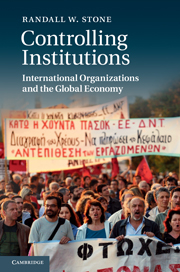Crossref Citations
This Book has been
cited by the following publications. This list is generated based on data provided by Crossref.
Halliday, Terence C.
Pacewicz, Josh
and
Block-Lieb, Susan
2011.
Who Governs? Delegations in Global Trade Lawmaking.
SSRN Electronic Journal,
Van de Graaf, Thijs
2011.
Fragmentation in Global Energy Governance: Explaining the Creation of IRENA.
SSRN Electronic Journal,
Willett, Thomas D.
2011.
Comment on Vreeland (2011): Foreign aid and global governance: Buying Bretton Woods—the Swiss-bloc case.
The Review of International Organizations,
Vol. 6,
Issue. 3-4,
p.
469.
Vreeland, James Raymond
2011.
Foreign aid and global governance: Buying Bretton Woods – the Swiss-bloc case.
The Review of International Organizations,
Vol. 6,
Issue. 3-4,
p.
369.
Fang, Songying
and
Stone, Randall W.
2012.
International Organizations as Policy Advisors.
International Organization,
Vol. 66,
Issue. 4,
p.
537.
Manulak, Michael
2012.
Transforming International Institutions: Renewal and Global Institutional Change.
SSRN Electronic Journal,
Clegg, Liam
2012.
Global governance behind closed doors: The IMF boardroom, the Enhanced Structural Adjustment Facility, and the intersection of material power and norm stabilisation in global politics.
The Review of International Organizations,
Vol. 7,
Issue. 3,
p.
285.
McLean, Elena V.
and
Stone, Randall W.
2012.
The Kyoto Protocol: Two-Level Bargaining and European Integration1.
International Studies Quarterly,
Vol. 56,
Issue. 1,
p.
99.
Schneider, Christina J.
and
Urpelainen, Johannes
2012.
Accession Rules for International Institutions.
Journal of Conflict Resolution,
Vol. 56,
Issue. 2,
p.
290.
Baccini, Leonardo
and
Urpelainen, Johannes
2012.
Strategic Side Payments: Preferential Trading Agreements, Economic Reform, and Foreign Aid.
The Journal of Politics,
Vol. 74,
Issue. 4,
p.
932.
MURDOCH, ZUZANA
2012.
Negotiating the European External Action Service (EEAS): Analyzing the External Effects of Internal (Dis)Agreement*.
JCMS: Journal of Common Market Studies,
Vol. 50,
Issue. 6,
p.
1011.
Dunoff, Jeffrey L.
and
Pollack, Mark A.
2012.
Interdisciplinary Perspectives on International Law and International Relations.
p.
626.
Broome, André
and
Seabrooke, Leonard
2012.
Seeing like an International Organisation.
New Political Economy,
Vol. 17,
Issue. 1,
p.
1.
Johnson, Tana
and
Urpelainen, Johannes
2012.
A Strategic Theory of Regime Integration and Separation.
International Organization,
Vol. 66,
Issue. 4,
p.
645.
Thompson, Alexander
2012.
Interdisciplinary Perspectives on International Law and International Relations.
p.
502.
Halliday, Terence C.
Pacewicz, Josh
and
Block‐Lieb, Susan
2013.
Who governs? Delegations and delegates in global trade lawmaking.
Regulation & Governance,
Vol. 7,
Issue. 3,
p.
279.
Morrison, Kevin M.
2013.
Membership no longer has its privileges: The declining informal influence of Board members on IDA lending.
The Review of International Organizations,
Vol. 8,
Issue. 2,
p.
291.
Hennessy, Alexandra
2013.
Informal Governance and the Eurozone Crisis.
Journal of Contemporary European Studies,
Vol. 21,
Issue. 3,
p.
429.
Broome, André
2013.
The politics of IMF–EU co-operation: institutional change from the Maastricht Treaty to the launch of the euro.
Journal of European Public Policy,
Vol. 20,
Issue. 4,
p.
589.
Kleine, Mareike
2013.
Knowing your limits: Informal governance and judgment in the EU.
The Review of International Organizations,
Vol. 8,
Issue. 2,
p.
245.



